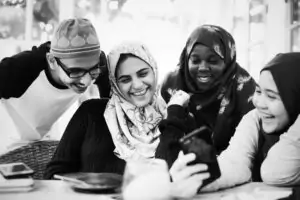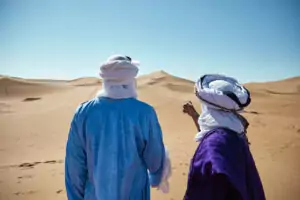The Arabic language, with its rich tapestry of sounds and expressions, is a fascinating study in culture and linguistics. But for the beginner, it can seem quite daunting. Let’s start with something simple but essential – how to say “Hello” in Arabic.

✅ AI Essay Writer ✅ AI Detector ✅ Plagchecker ✅ Paraphraser
✅ Summarizer ✅ Citation Generator
The Art of Arabic Greetings
Arabic greetings are a key part of the Arab culture, reflecting its values of hospitality and respect. They go beyond a simple exchange of salutations; they are an integral part of social etiquette and form the bedrock of interpersonal relationships. A phrasebook or guidebook would be incomplete without them, and so would any conversation. So, let’s discover these popular Arabic greetings.
Saying “Hello” in Arabic
The most common greeting in Arabic, synonymous with “hello,” is “As-salamu alaykum.” This beautiful phrase means “Peace be upon you,” an offering of peace to the person you are addressing. Its response is “Wa’alaykumu as-salam,” which means “And upon you, peace.” These phrases exhibit the Arab culture’s emphasis on peace and harmony in their interactions. Pronouncing “As-salamu alaykum” can be a little tricky for beginners. It is pronounced as “ass-sa-la-mu-alai-kum.”
Arabic greetings have formal and informal variations, much like other languages. These greetings serve different purposes and are used in different contexts.
Formal Arabic Greetings
Formal greetings in Arabic are often longer and show a high level of respect. Besides the universal “As-salamu alaykum,” there are greetings like:
- “Ahlan wa sahlan” (Welcome),
- “Sabah al-khayr” (Good morning),
- and “Masaa al-khayr” (Good evening).
These phrases are familiar in both casual and formal settings.
Informal Arabic Greetings
Informal greetings are more relaxed and used among friends and acquaintances. A simple “Ahlan” (Hi) or “Marhaba” (Hello) will suffice in casual chats. Remember that the Arabic language is rich and diverse, with different dialects across the Arab world, so you might hear variations of these greetings.
Arabic Greetings Across Different Dialects
Arabic, as a language, is a compilation of numerous dialects that vary from country to country. Saying “hi” in one dialect may differ slightly or significantly from another. For instance, in Egyptian Arabic, “Ahlan” is used frequently, while in Levantine Arabic (spoken in Syria, Lebanon, Jordan, and Palestine), “Marhaba” is common.
Arabic Greetings and the Arab Culture
Arab culture is steeped in tradition, etiquette, and manners. The act of greeting is not merely an exchange of words but an expression of respect and hospitality. Arab people are known for their generosity and welcoming nature, and their greetings reflect this trait. When you say “As-salamu alaykum,” it isn’t just a hello; it’s an offering of peace, a warm welcoming into a conversation or a home.
Arabs typically prefer formal greetings, especially when meeting someone for the first time or in formal situations. It’s essential to reciprocate a greeting, which is seen as an act of mutual respect. In formal settings, men and women usually greet people of the same sex with a handshake. The left hand is considered impure, so always use the right hand for handshakes or handing something to someone.
Learning Arabic Greetings
Mastering the art of Arabic greetings takes practice. Start with the basics like “As-salamu alaykum” and “Marhaba,” then gradually build your vocabulary with more complex greetings. Use language learning apps, join language exchange groups, or take formal lessons if needed.
Remember, when learning a new language, making mistakes is part of the journey. Arabic speakers appreciate any effort to communicate in their language, so don’t shy away from trying. In time, you’ll find yourself comfortably navigating through the waters of Arabic greetings.
Conclusion
Learning to say “hello” in Arabic opens doors to meaningful conversations and deeper cultural experiences. Whether you’re planning a trip to an Arabic-speaking country, learning the language, or simply want to connect with Arabic-speaking friends, understanding Arabic greetings is a valuable skill. Remember, each greeting is more than a word; it’s a display of respect, hospitality, and peace.
FAQ
What are the common Arabic greetings?
Common Arabic greetings include “As-salamu alaykum” (Peace be upon you), “Marhaba” (Hello), “Ahlan wa sahlan” (Welcome), “Sabah al-khayr” (Good morning), and “Masaa al-khayr” (Good evening).
How can I greet someone in Arabic?
The most common way to greet someone in Arabic is by saying “As-salamu alaykum.” However, depending on the time of day or the nature of the situation, you might use other greetings like “Sabah al-khayr” (Good morning) or “Masaa al-khayr” (Good evening).
Are there different ways to say hi in Arabic?
Yes, there are several ways to say “hi” in Arabic. “Marhaba” and “Ahlan” are common informal ways, while “As-salamu alaykum” is the standard formal greeting.
What is the Arabic word for hello?
The Arabic word for hello is “Marhaba”. But the more commonly used phrase is “As-salamu alaykum,” which means “Peace be upon you.”
What are the polite ways to greet in Arabic?
Polite ways to greet in Arabic include “As-salamu alaykum,” “Ahlan wa sahlan,” “Sabah al-khayr,” and “Masaa al-khayr.”
Can you provide a list of basic Arabic greetings?
Here are some basic Arabic greetings:
- As-salamu alaykum: Peace be upon you
- Wa’alaykumu as-salam: And upon you, peace
- Ahlan wa sahlan: Welcome
- Sabah al-khayr: Good morning
- Masaa al-khayr: Good evening
- Marhaba: Hello
- Ahlan: Hi
How do I pronounce hello in Arabic?
The phrase “As-salamu alaykum,” which is commonly used as “hello” in Arabic, is pronounced as “ass-sa-la-mu-alai-kum.”
What are the informal ways to say hi in Arabic?
The informal ways to say “hi” in Arabic are “Ahlan” and “Marhaba.”
Are there any cultural considerations when greeting in Arabic?
Yes, there are cultural considerations when greeting in Arabic. It’s crucial to respond when someone greets you as it’s considered a sign of mutual respect. Also, use the right hand for handshakes or when handing over something to someone, as the left hand is considered impure in Arab cultures.
How to say hi in different Arabic dialects?
Saying “hi” can vary in different Arabic dialects. For instance, in Egyptian Arabic, “Ahlan” is commonly used. Meanwhile, in Levantine Arabic (spoken in Syria, Lebanon, Jordan, and Palestine), “Marhaba” is more commonly used.
Follow us on Reddit for more insights and updates.





Comments (0)
Welcome to A*Help comments!
We’re all about debate and discussion at A*Help.
We value the diverse opinions of users, so you may find points of view that you don’t agree with. And that’s cool. However, there are certain things we’re not OK with: attempts to manipulate our data in any way, for example, or the posting of discriminative, offensive, hateful, or disparaging material.